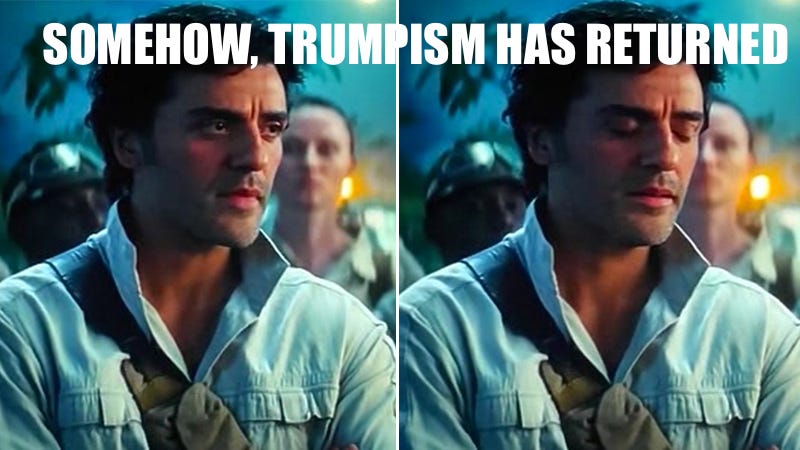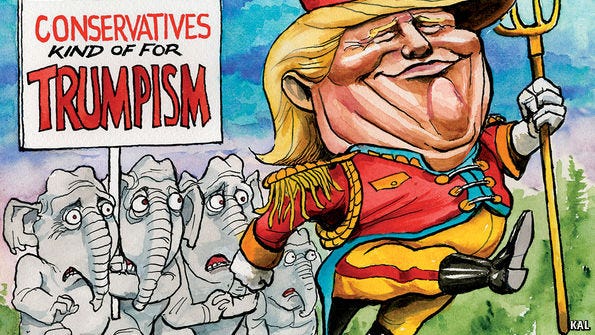Trump, Oren Cass, and the Clone Wars
An analogy about "Trumpism" and the Separatist Movement
This is a community contribution from political writer, Albert Gustafson. To pitch your own idea to Politicize Me, email me directly: stephen.kent89@gmail.com
Donald Trump’s presidency died with the 2020 election, but by 2024, we might be saying, “Somehow, Trumpism has returned.” The Republican civil war he started four years ago will soon begin anew, but it is little clearer now than then what Trumpism is from a policy standpoint. This is because, as it turned out, Trump was always more opportunist than policy idealist—more General Grievous than Count Dooku.
When the Confederacy of Independent Systems (CIS) seceded from the Republic, they rallied around Dooku—a disaffected Jedi and charismatic ideologue who united thousands of systems disgruntled with the Republic’s corruption, taxation, ineptitude, and hypocrisy. Dooku’s political idealism and personal magnetism provided the CIS with the coherent political agenda they needed to stand together against the Republic.

In 2016, some observers thought that Donald Trump might do something similar for discontented Republicans and Independents. Trump’s economics during the 2016 race eschewed Republican orthodoxy, calling for big infrastructure spending and big tariffs and vowing not to cut Medicare or Social Security. He also hinted vaguely at a big universal health care plan. For conservatives like Oren Cass, Trump represented a possibility to divorce the GOP from “market fundamentalism.”
But once in office, President Trump quickly ceded most of the governing to establishment Republicans who did establishment Republican things: cut taxes, nominate judges, and pretend to reform healthcare. Cass’s hopes for a new conservative economics never materialized under Trump.
In this way, having Trump at the helm is like Grievous leading the Confederacy of Independent Systems. Grievous only wanted to win the war, just as Trump only wanted to win the election. While Dooku recognized the Trade Federation and the Banking Clan as essential partners in contesting the power of the Galactic Republic, he used them as pawns in a larger strategy designed to accomplish political goals. By the time General Grievous took power, the CIS’s political aspirations were all but dead at the hand of the Jedi and the clone army, and the new droid leader did not share Dooku’s political convictions. Grievous was happy to leave the politics to the Trade Federation and the Banking Clan, and President Trump, similarly, was happy to leave governing to Paul Ryan, Mitch McConnell, and other establishment types.
Interestingly, it was not a Dooku-like idealist that fomented the civil war within the GOP, but Grievous-like opportunists who recognized and took advantage of preexisting discontent. By winning the election in 2016, President Trump put General Grievous before Count Dooku in the GOP civil war. A robust competitor to the Republican policy consensus never congealed before the anti-establishment energy was coopted by a non-ideological droid general.
Nonetheless, a real constituency of malcontents existed in 2016 that Trump used to propel himself to the presidency, and his narrow defeat in 2020 failed to send a strong message about what exactly the electorate wants. The next four years will determine whether a Republican Dooku can turn GOP dissenters into a disciplined and competitive new vision for the party, or if the GOP will end up like the CIS—sent to Mustafar to be “taken care of.”
This is a community contribution from political writer, Albert Gustafson. To pitch your own idea to Politicize Me, email me directly: stephen.kent89@gmail.com
It’s me, Stephen Kent! I’m the curator of Politicize Me, host of the Beltway Banthas Podcast forthcoming author of ‘How The Force Can Fix The World’ (Hachette-Center Street). You can follow me on Twitter @Stephen_Kent89.





